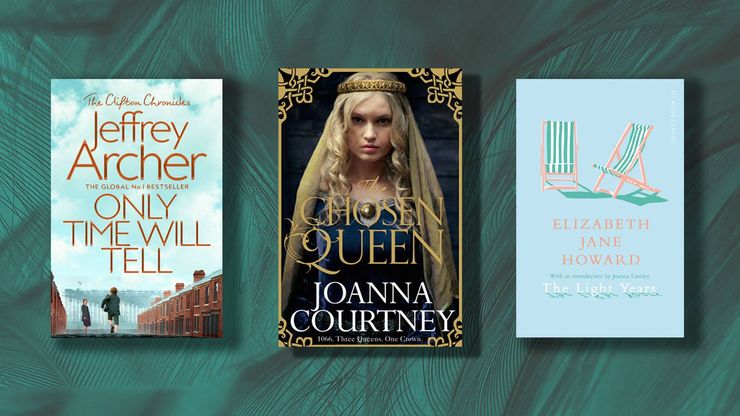The Poldark books by Winston Graham in order
If you loved Poldark starring Adrian Turner as Ross Poldark, don't miss Winston Graham's series of Cornish novels, on which the BBC series was based.

The fifth and final season of Poldark has finished, and fans are left with a Ross-shaped gap in their lives. If you're still missing the series, why not read Winston Graham's series of Cornish novels, on which the TV adaptation was based. Here's all the Poldark books in order. Be warned, there may well be spoilers ahead.
If you can't get enough historical fiction, don't miss our edit of the best historical fiction books of all time.
The bestselling Poldark series is loved across the world for its compulsive blend of romance, drama, unforgettable characters and beautifully evocative portrayal of Cornwall.
The saga, which spans the late eighteenth and early nineteenth centuries, follows the life of the brooding, principled Ross Poldark; a young man who returns from the American Revolutionary War to find his father dead, his copper mine failing and his childhood sweetheart, the beautiful Elizabeth Chynoweth, engaged to his cousin. Romance, intrigue, betrayal, and one of the most heart-breaking love triangles in modern fiction ensue as Ross falls in love with the charming Demelza and tries to build a better world for her and their children whilst fighting his arch-enemy, the swaggering and ruthless financier, George Warleggan.
Written by Winston Graham between 1945 and 2002, the twelve novels proved absolutely perfect for television, and two BBC series - the first starring Robin Ellis and Angharad Rees in the 1970s and the second, which premiered in 2015, starring Aiden Turner and Eleanor Tomlinson - were enormous successes.
Ross Poldark
by 1451

Poldark Book One - Series One
Tired from a grim war in America, Ross Poldark returns to his land and his family. But the joyful homecoming he has anticipated turns sour, for his father is dead, his estate is derelict and the girl he loves is engaged to his cousin.
But his sympathy for the destitute miners and farmers of the district leads him to rescue a half-starved urchin girl from a fairground brawl and take her home - an act which alters the whole course of his life . . .
Demelza
by 1451

Poldark Book Two- Series One
Demelza Carne, the impoverished miner's daughter Ross Poldark rescued from a fairground rabble, is now his wife. But the events of these turbulent years test their marriage and their love.
Demelza's efforts to adapt to the ways of the gentry - and her husband - bring her confusion and heartache, despite her joy in the birth of their first child. Ross begins a bitter struggle for the rights of the mining communities - and sows the seed of an enduring enmity with powerful George Warleggan.
Jeremy Poldark
by 1451

Poldark Book Three - Series Two
Cornwall 1790. Ross Poldark faces the darkest hour of his life. accused of wrecking two ships, he is to stand trial at the Bodmin Assizes.
Despite their stormy married life, Demelza has tried to rally support for her husband. But there are enemies in plenty who would be happy to see Ross convicted, not least George Warleggan, the powerful banker, whose personal rivalry with Ross grows ever more intense.
Warleggan
by 1451

Poldark Book Four - Series Two
Cornwall 1792. Ross plunges into a highly speculative mining venture which threatens not only his family's financial security but also his turbulent marriage to Demelza.
When Ross and Elizabeth's old attraction rekindles itself, Demelza retaliates by becoming dangerously involved with a handsome Scottish cavalry officer. With bankruptcy an increasingly real possibility, the Poldarks seem to be facing disaster on all fronts.
The Black Moon
by 1451

Poldark Book Five - Series Three
Cornwall 1794. The birth of a son to Elizabeth and George Warleggan serves only to accentuate the rift between the Poldark and Warleggan families. and when Morwenna Chynoweth, now governess to Elizabeth's eldest son, grows to love Drake Carne, Demelza's brother, the enduring rivalry between George and Ross finds a new focus for bitter enmity and conflict.
The Four Swans
by 1451

Poldark Book Six - Series Three
Cornwall 1795 -1799. Although Ross Poldark - now something of a war hero - seems secure in his hard-won prosperity, a new dilemma faces him in the sudden infatuation of a young naval officer for his wife Demelza.
All four women - the four swans - whose lives touch Ross's face a crisis in these years. For his wife Demelza, his old love Elizabeth, for his friend's new wife Caroline and for the unhappy Morwenna Chynoweth these are times of stress and conflict.
The Angry Tide
by 1451

Poldark Book Seven
Cornwall, towards the end of the 18th century. Ross Poldark sits for the borough of Truro as Member of Parliament - his time divided between London and Cornwall, his heart divided about his wife, Demelza. his old feud with George Warleggan still flares - as does the illicit love between Morwenna and Drake, Demelza's brother.
Before the new century dawns, George and Ross will be drawn together by a loss greater than their rivalry - and Morwenna and Drake by a tragedy that brings them hope . . .
The Stranger From The Sea
by 1451

Poldark Book Eight
Cornwall 1810. The Poldark family awaits the return of Ross from his mission to Wellington's army in Portugal. But their ordered existence ends with Jeremy Poldark's dramatic rescue of the stranger from the sea.
Stephen Carrington's arrival in the Poldark household changes all their lives. For Clowance and Jeremy in particular, the children of Ross and Demelza, Stephen's advent is the key to a new world - one of both love and danger.
The Miller's Dance

Poldark Book Nine
Cornwall 1812. At Nampara, the Poldark family finds the New Year brings involvement in more than one unexpected venture. For Ross and Demelza there is some surprising - and worrying - news. And Clowance, newly returned from her London triumphs, finds that her entanglement with Stephen Carrington brings not only happiness but heartache.
As the armies battle in Spain, and the political situation at home becomes daily more obscure, the Poldark and Warleggan families find themselves thrust into a turbulent new era as complex and changing as the patterns of The Miller's Dance.
The Loving Cup

Poldark Book Ten
Cornwall 1813. A silver cup lies half-forgotten in a dank cave, amongst a pile of stolen goods. Yet the tiny vessel and its inscription Amor gignit amorem haunts the lives of the still-feuding Poldark and Warleggan families, as Ross, Demelza and the ambitious and powerful Sir George Warleggan watch their children make the decisions that will shape their destinies.
In the closing years of the wars against Napoleon, for Jeremy and Clowance, and for arrogant, cynical Valentine Warleggan, these are troubled and momentous times . . .
The Twisted Sword

Poldark Book Eleven
Cornwall 1815. Demelza sees a horseman riding down the valley and senses disruption to the domestic contentment she has fought so hard to achieve. For Ross has little option but to accept the summons - and travel to Paris with his family, as an 'observer' of the French armed forces.
Parisian life begins well with an exhilarating round of balls and parties. But the return of Napoleon brings separation, distrust and danger to the Poldarks . . . and always for Demelza there is the shadow of the secret she does not even share with Ross.
Bella Poldark

Poldark Book Twelve
Cornwall 1818. We continue the tale of Ross and Demelza; of the wayward Valentine Warleggan, whose existence keeps open the old wounds of the feud between Ross and George.
Bella, the Poldark's youngest daughter, whose precocious talent as a singer is encouraged by her old flame, Christopher Havergal, and by a distinguished French conductor, who has more in mind than Bella's music; of Clowance, the Poldark's widowed daughter, who considers remarriage to one of two rival suitors; and of a murderer who stalks the villages of West Cornwall.
Listen to clips from the Poldark audiobooks series below.


